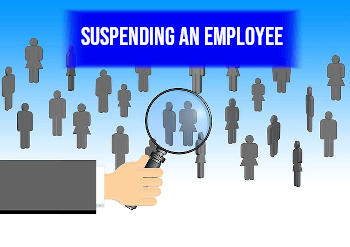 Suspending an employee
Suspending an employee
You need a very good reason
Because of the impact it can have on an employee, as an employer you must have a very good reason to suspend them. When can I suspend an employee? How should I suspend an employee? These are just some of the questions we examine in this article about suspending an employee in Ireland.
Suspension of an employee usually arises when an allegation of misconduct arises in connection with them. A decision has to be made early on regarding their suspension. Ask the question, can I carry out the investigation in a fair manner without suspending the employee? If the answer is yes, then you should not suspend them. If there is a risk that they will interfere with witnesses, tamper with evidence or cause damage to the property or reputation of the business, then you should strongly consider suspension of the employee. Suspension should never be about punishment.
It might seem like a good idea at the time. Suspend the employee and carry out an investigation into a disciplinary matter. It is easier to talk to other employees when the subject of the complaint is not around. What loss can they suffer if they are on full pay? It will be like a paid holiday. If you continue in that train of thought it will be more like a major claim in the Workplace Relations Commission and many hours and days spent preparing for and fighting the claim, probably without success.
What should I consider before suspending an employee?
The first thing you should do is find out the full extent of the allegations against the employee. Get the person making the complaint to outline it in full detail. Then when you are clear about what is being alleged, talk to the accused employee and listen to their side. The verb listen is the most important word in that previous sentence. Having listened to both sides, you can then consider whether or not it is appropriate to suspend the employee while you carry out an investigation into the allegation.
In The Governor and Company of the Bank of Ireland and James Reilly the Court pointed out the serious nature of suspending an employee. In particular it stated that the reputational damage may never be overcome, even where the accused is cleared of the initial allegations. The case is regarded as the leading guidance for suspending an employee. It was stated that suspension would be justified in the following circumstances:
-
To prevent repetition of the conduct complained of;
-
To prevent interference with evidence;
-
To protect individuals at risk from such conduct; or
-
To protect the employer’s business and reputation.
In the light of this and other cases you should consider the following points before suspending an employee prior to investigating a disciplinary matter:
-
What alternatives are there? Having identified the risks, is there another way to protect the evidence/eliminate the risk? For example, limiting access to certain parts of the business.
-
Is suspension covered in the contract of employment or any related staff documents.
-
This is usually covered in the disciplinary policy document. If you do not have one, you should get one.
-
Are you authorised by your company to suspend another employee? In other words, is it above your pay grade?
-
How does the suspension affect the employee? Will it damage the trust and confidence between the employer and the employee?
-
Is the alleged offence sufficiently serious to merit a suspension?
How do I suspend an employee?
If, having carefully considered the above matters, you believe that the decision to suspend an employee on full pay, while you investigate a disciplinary matter can be justified then you should take these additional steps:
-
Notify the accused employee, in writing, of the reason for their suspension and the fact that it is temporary. This must be clearly stated, so that the accused can fully understand the extent of the allegations.
-
Emphasise the confidential nature of the matter
-
Outline some do’s and don’ts for them. For example, do be available to assist the investigation and don’t carry out work for themselves or anyone else during working hours
-
Remain available for work
-
Do not attend the office or contact fellow workers or business contacts.
-
Appoint an independent person to carry out the investigation, efficiently and without delay.
-
Follow your company disciplinary procedures.
-
Let the accused know that they will have an opportunity to state their case in detail
-
Decide on what to say to other employees. Keep the matter confidential, but give neutral explanations. e.g. absent on personal grounds.
-
Nominate someone to handle enquiries on behalf of the suspended employee, if necessary.
-
Only suspend for the shortest possible time. Indefinite suspension will be seen as a punishment and a breach of contract.
-
Put it in writing. This covers all communication with employees, as well as decisions you make, and how you made them.
Where can I get a useful precedent of an employee suspension letter?
In our DIY documents section we offer a great selection of useful precedents for employer and employee. Have a look at our employee suspension letter. It is designed to help employers who need to send a suspension letter to an employee pending an investigation into a disciplinary matter.
When can a suspended employee return to work ?
If the investigation has been completed and the assessed risks on longer pose a threat, then the employee should be free to resume work duties. You should meet with the employee to help them return to work. Encourage them to share their views on returning to work. Agree on what to tell other employees in explanation of their absence.
Where can I get help and assistance in relation to suspending an employee prior to carrying out an investigation?
It can be helpful to get another opinion on what you should do, when considering the suspension of an employee pending an investigation of a disciplinary matter. Contact us using the orange Tell Me More button below and we will be in touch at a time that suits.
Spread the knowledge. If you found this article useful, please like and share using any of the social buttons below






